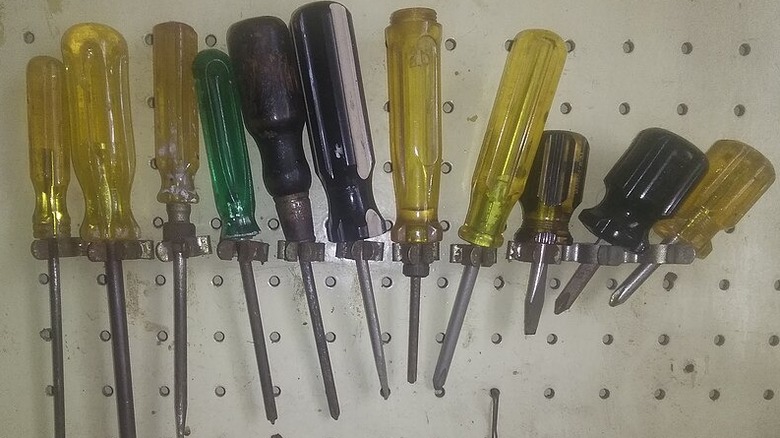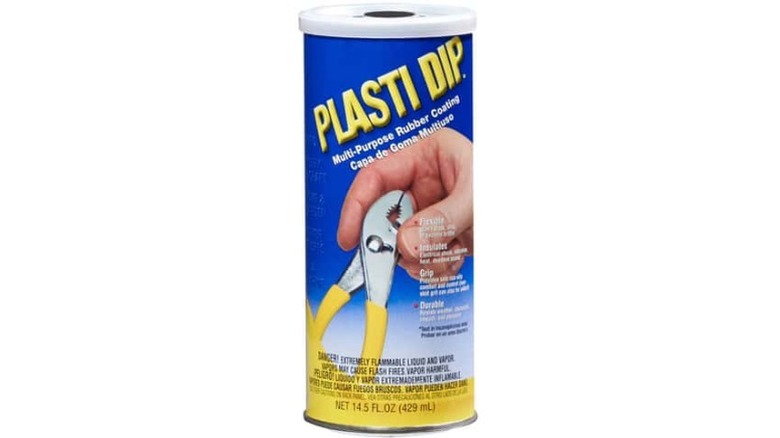If Your Tool Box Smells Disgusting, This Is Probably Why
We may receive a commission on purchases made from links.
You may have noticed a strong and unpleasant stench emanating from your toolbox on days that are particularly hot or humid. Admittedly, the average toolbox isn't exactly what most people would consider to be a sterile environment. Many of the tools inside it may have come into contact with anything from sawdust to engine grease, and so it's not uncommon for the box itself to develop a bit of a metallic or chemical smell, but unless you've recently been working with raw sewage, there's not a whole lot of reasons why it should smell overly pungent. Even so, this can happen to any toolbox — even those made by the best major brands.
Your first thought might be that some rodent made its nest beneath the tools and died, or perhaps that long-forgotten leftovers from a distant lunch have been abandoned to rot. It's much more of a project when your car stinks since there are a million places where an odoriferous object might be hiding, but you can usually examine the essentials in your toolbox kit relatively quickly. If there's no obvious culprit, then it's possible that the source of the smell is actually the materials that were used to make the tools' handles.
CAB handles smell when they break down
Those whose toolboxes are populated with a lot of older tools may have a few items with handles made of cellulose acetate butyrate (CAB). According to Chemical Book, this substance "is a thermoplastic material derived from cellulose. It is a clear and amorphous polymer that combines the benefits of cellulose acetate and cellulose butyrate. CAB offers a unique combination of clarity, impact resistance, and chemical resistance, making it a popular choice in various industries." The addition of cellulose generates a sturdier substance than acetate alone. Not only is CAB stronger, but it also has several other desirable qualities, such as low moisture absorption, weather resistance, high transparency, and a resistance to most of the household chemicals that it's likely to come into contact with. All of these reasons make compelling arguments for why many tool manufacturers used the substance in the production of those clear, plastic handles that were so popular in the '80s and '90s. The plastic that it produces is firm, easy to clean, and able to remain firm in the face of a wide variety of conditions and substances -– for a while. Unfortunately, this CAB doesn't last forever.
The cellulose in CAB is a complex carbohydrate that is largely composed of glucose, such as what is found in the basic structural components of plant cells. This will start to decompose over time and release the butyric acid in the compound, which is known to produce a pungent odor that some have described as "vomit-like."
Re-sealing the handles can contain the smell
So, what do you do if your CAB-handled tools start to smell? You probably don't want to keep using them, and the decomposition process can't really be halted once it's begun. That said, you have a few options that you can try before chucking them in the trash.
One is to see if you can exchange them. Some brands, such as Craftsman, offer lifetime warranties on their hand tools. In these instances, your best option may be to take them in and see if you can get a replacement. Even tools that are decades old may be replaceable if they meet the conditions of the warranty, and nothing fixes a problem like a brand-new tool.
Another option is to seal the handles. One of the easiest substances to do this with is either a liquid silicone or a silicone-based paint, as this will provide the handle with a surface that is both comfortable to grip and easy to clean, though you can also coat it in shellac or lacquer if you want the handle to retain a harder and less textured feel. There are also several other DIY ways to add more professional hand grips to your tools, such as special rubber or plastic dips. Just make sure whatever method you choose is air-tight and that it covers all of the CAB plastic.


